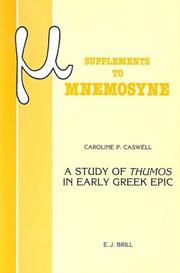| Listing 1 - 1 of 1 |
Sort by
|

ISBN: 9004092609 9004329102 9789004092600 9789004329102 Year: 1990 Volume: 114 Publisher: Leiden ;New York E.J. Brill
Abstract | Keywords | Export | Availability | Bookmark
 Loading...
Loading...Choose an application
- Reference Manager
- EndNote
- RefWorks (Direct export to RefWorks)
The language of early Greek epic, exemplified primarily by Homer, contains numerous descriptions of inner states and uses a specific vocabulary to do so. Scholars understand these descriptions in a general way; but the precision of the expressions remains a mystery. In this work, one of the most important of these words, thumos , is examined in each of its contexts. This synchronic formulaic analysis is carried out according to the contexts of thumos : the cognitive/intellectual, the emotional, and the physical. Two additional contexts, deliberation and motivation, are discussed separately. Within the discussion of each context, the functional synonyms of thumos, particulary phren/phrenes , and other frequent associates of thumos , are examined. Thumos has associations with words relating to winds and storms, a fact which helps clarify its significance in all contexts. Because this work is a discussion of thumos in all contexts, and also contains an appendix of the relevant passages, it should be useful to scholars engaged in research on Homeric vocabulary.
Lexicology. Semantics --- Classical Greek language --- Thumos (Grieks woord) --- Thumos (Mot grec) --- Thumos (The Greek word) --- Epic poetry, Greek --- Thymos (The Greek word) --- Poésie épique grecque --- Thumos (Le mot grec) --- History and criticism. --- Histoire et critique --- -Thymos (The Greek word) --- Greek language --- Greek epic poetry --- Epic poetry, Classical --- Greek poetry --- History and criticism --- Etymology --- Thymos (The Greek word). --- Poésie épique grecque --- Epic poetry, Greek. --- Epic poetry, Greek - History and criticism.
| Listing 1 - 1 of 1 |
Sort by
|

 Search
Search Feedback
Feedback About UniCat
About UniCat  Help
Help News
News